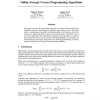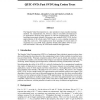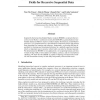102
Voted
NIPS
2008
15 years 2 months ago
2008
We present a novel method for inducing synchronous context free grammars (SCFGs) from a corpus of parallel string pairs. SCFGs can model equivalence between strings in terms of su...
118
click to vote
NIPS
2008
15 years 2 months ago
2008
Distributed learning is a problem of fundamental interest in machine learning and cognitive science. In this paper, we present asynchronous distributed learning algorithms for two...
100
Voted
NIPS
2008
15 years 2 months ago
2008
We study the behavior of block 1/ 2 regularization for multivariate regression, where a K-dimensional response vector is regressed upon a fixed set of p covariates. The problem of...
105
Voted
NIPS
2008
15 years 2 months ago
2008
Query expansion is a long-studied approach for improving retrieval effectiveness by enhancing the user's original query with additional related words. Current algorithms for ...
114
Voted
NIPS
2008
15 years 2 months ago
2008
Compressive Sensing (CS) combines sampling and compression into a single subNyquist linear measurement process for sparse and compressible signals. In this paper, we extend the th...
102
click to vote
NIPS
2008
15 years 2 months ago
2008
This paper examines the generalization properties of online convex programming algorithms when the loss function is Lipschitz and strongly convex. Our main result is a sharp bound...
157
Voted
NIPS
2008
15 years 2 months ago
2008
The Singular Value Decomposition is a key operation in many machine learning methods. Its computational cost, however, makes it unscalable and impractical for applications involvi...
103
Voted
NIPS
2008
15 years 2 months ago
2008
We propose a general method called truncated gradient to induce sparsity in the weights of onlinelearning algorithms with convex loss functions. This method has several essential ...
115
Voted
NIPS
2008
15 years 2 months ago
2008
Inspired by the hierarchical hidden Markov models (HHMM), we present the hierarchical semi-Markov conditional random field (HSCRF), a generalisation of embedded undirected Markov ...
101
Voted
NIPS
2008
15 years 2 months ago
2008
We develop the syntactic topic model (STM), a nonparametric Bayesian model of parsed documents. The STM generates words that are both thematically and syntactically constrained, w...




